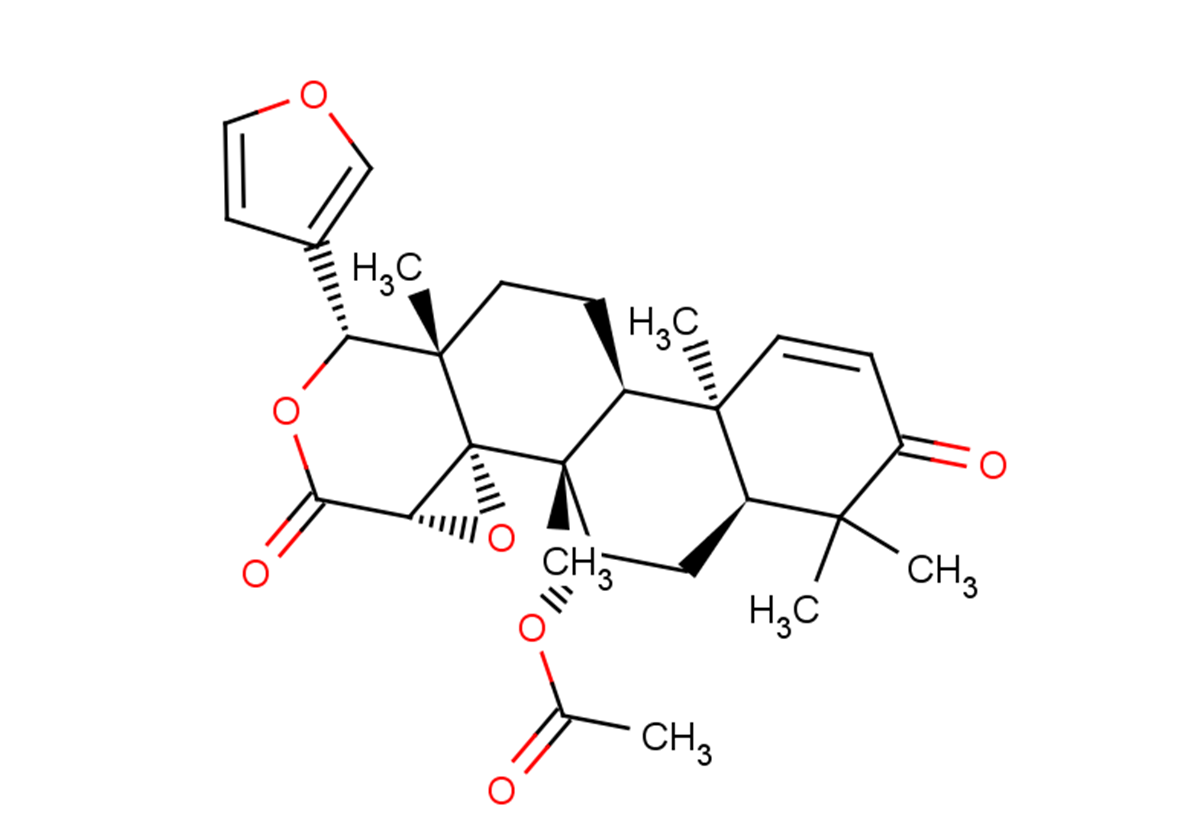
Gedunin
CAS No. 2753-30-2
Gedunin( —— )
Catalog No. M24185 CAS No. 2753-30-2
Gedunin is an important limonoid present in several genera of the Meliaceae family, mainly in seeds.?Gedunin is an Hsp90 inhibitor, and inhibits ovarian cancer cell proliferation.
Purity : >98% (HPLC)
 COA
COA
 Datasheet
Datasheet
 HNMR
HNMR
 HPLC
HPLC
 MSDS
MSDS
 Handing Instructions
Handing Instructions
| Size | Price / USD | Stock | Quantity |
| 5MG | 1107 | In Stock |


|
| 10MG | 1512 | In Stock |


|
| 25MG | 2241 | In Stock |


|
| 50MG | 3024 | In Stock |


|
| 100MG | 4077 | In Stock |


|
| 200MG | Get Quote | In Stock |


|
| 500MG | Get Quote | In Stock |


|
| 1G | Get Quote | In Stock |


|
Biological Information
-
Product NameGedunin
-
NoteResearch use only, not for human use.
-
Brief DescriptionGedunin is an important limonoid present in several genera of the Meliaceae family, mainly in seeds.?Gedunin is an Hsp90 inhibitor, and inhibits ovarian cancer cell proliferation.
-
DescriptionGedunin is an important limonoid present in several genera of the Meliaceae family, mainly in seeds.?Gedunin is an Hsp90 inhibitor, and inhibits ovarian cancer cell proliferation.
-
In Vitro——
-
In Vivo——
-
Synonyms——
-
PathwayCytoskeleton/Cell Adhesion Molecules
-
TargetHSP
-
RecptorHsp90
-
Research Area——
-
Indication——
Chemical Information
-
CAS Number2753-30-2
-
Formula Weight482.57
-
Molecular FormulaC28H34O7
-
Purity>98% (HPLC)
-
Solubility——
-
SMILESO=C1O[C@H](C2=COC=C2)[C@@]3(C)[C@]4([C@]5(C)[C@@H](CC3)[C@@](C)(C=C6)[C@@H](C(C)(C)C6=O)C[C@@H]5OC(C)=O)O[C@@H]41
-
Chemical Name——
Shipping & Storage Information
-
Storage(-20℃)
-
ShippingWith Ice Pack
-
Stability≥ 2 years
Reference
1.Subramani R , Gonzalez E , Nandy S B , et al. Gedunin inhibits pancreatic cancer by altering sonic hedgehog signaling pathway[J]. Oncotarget, 2016, 8(7).
molnova catalog



related products
-
DN401
DN401 is a potent TRAP1 and Hsp90 Inhibitor( IC50 = 79 nM for TRAP1, IC50 = 698 nM for Hsp90) with potent anticancer activity.
-
GRP78-IN-3
GRP78-IN-3, a potent small-molecule-competitive inhibitor of Hsp70 substrate binding and is a selective Grp78 (HSPA5) inhibitor with an IC50 of 0.59 μM.
-
Eupalinolide A(b)
Eupalinolide B is a natural product and demonstrates potent cytotoxicity against A-549 BGC-823 SMMC-7721 and HL-60 tumour cell lines.



 Cart
Cart
 sales@molnova.com
sales@molnova.com


